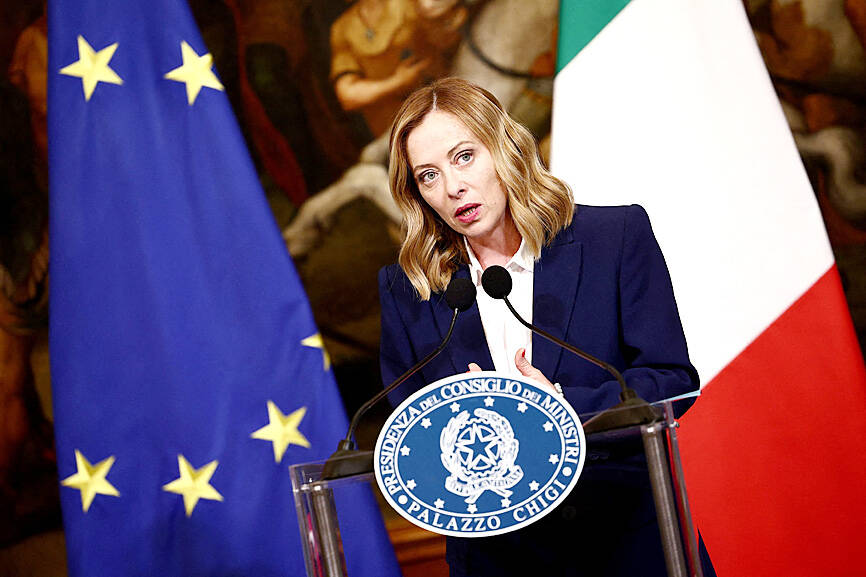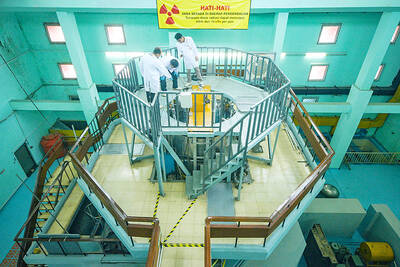Italian Prime Minister Giorgia Meloni on Tuesday told her Brothers of Italy party that it should expunge from its ranks anyone who idolizes Italy’s fascist past.
Her call came after an undercover media investigation last week released a video of members of her party’s youth wing making fascist salutes and chanting “Sieg Heil.”
In a letter to party leaders, Meloni said she was “angry and saddened” that their actions damaged the group’s reputation.

Photo: Reuters
“There is no room in Brothers of Italy for racism or anti-Semitism, nor is there space for those who are nostalgic for the totalitarian regimes of the 20th century or for any manifestation of foolish folklore,” she wrote. “Our task is too great for those who have not understood its scope to be allowed to ruin it.”
Brothers of Italy traces its roots to a neo-fascist group set up after World War II, but Meloni herself has looked to distance herself from the far right over the past few years and said her party is mainstream conservative.
Opposition parties leapt on the investigation by the online newspaper Fanpage. They said it showed Brothers of Italy was a refuge for extreme right-wingers, belying Meloni’s efforts to present a moderate image both at home and abroad.
Meloni, who last week denounced the newspaper’s undercover methods, on Tuesday said that Brothers of Italy had to be transparent and consistent.
“Anyone who believes there can be a public image of Brothers of Italy that does not correspond to their private behavior simply does not understand what we are, and thus is not welcome among us,” she said.
Fanpage published clips of youth members chanting “Duce,” a reference to Italy’s former fascist leader Benito Mussolini.
It also showed a group chat in which someone had posted the message: “Jewish people are a race and I despise them.”
Two youth members resigned last week after the second installment of the expose was released.

Four people jailed in the landmark Hong Kong national security trial of "47 democrats" accused of conspiracy to commit subversion were freed today after more than four years behind bars, the second group to be released in a month. Among those freed was long-time political and LGBTQ activist Jimmy Sham (岑子杰), who also led one of Hong Kong’s largest pro-democracy groups, the Civil Human Rights Front, which disbanded in 2021. "Let me spend some time with my family," Sham said after arriving at his home in the Kowloon district of Jordan. "I don’t know how to plan ahead because, to me, it feels

Poland is set to hold a presidential runoff election today between two candidates offering starkly different visions for the country’s future. The winner would succeed Polish President Andrzej Duda, a conservative who is finishing his second and final term. The outcome would determine whether Poland embraces a nationalist populist trajectory or pivots more fully toward liberal, pro-European policies. An exit poll by Ipsos would be released when polls close today at 9pm local time, with a margin of error of plus or minus 2 percentage points. Final results are expected tomorrow. Whoever wins can be expected to either help or hinder the

North Korea has detained another official over last week’s failed launch of a warship, which damaged the naval destroyer, state media reported yesterday. Pyongyang announced “a serious accident” at Wednesday last week’s launch ceremony, which crushed sections of the bottom of the new destroyer. North Korean leader Kim Jong-un called the mishap a “criminal act caused by absolute carelessness.” Ri Hyong-son, vice department director of the Munitions Industry Department of the Party Central Committee, was summoned and detained on Sunday, the Korean Central News Agency (KCNA) reported. He was “greatly responsible for the occurrence of the serious accident,” it said. Ri is the fourth person

SKEPTICAL: Given the challenges, which include waste disposal and potential domestic opposition, experts warn that the 2032 nuclear timeline is overambitious Indonesia is hoping going nuclear can help it meet soaring energy demand while taming emissions, but faces serious challenges to its goal of a first small modular reactor by 2032. Its first experiment with nuclear energy dates to February 1965, when then-Indonesian president Sukarno inaugurated a test reactor. Sixty years later, Southeast Asia’s largest economy has three research reactors, but no nuclear power plants for electricity. Abundant reserves of polluting coal have so far met the enormous archipelago’s energy needs, but “nuclear will be necessary to constrain the rise of and eventually reduce emissions,” said Philip Andrews-Speed, a senior research fellow at the